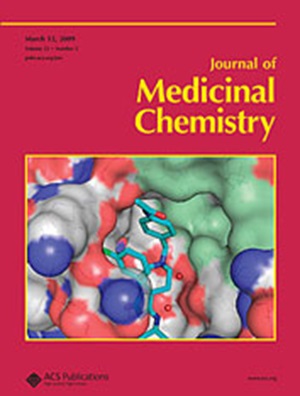以噻唑为基础的肿瘤丙酮酸激酶M2抑制剂:一种针对结直肠癌代谢和微生物协同作用的范式转移治疗策略。
IF 6.8
1区 医学
Q1 CHEMISTRY, MEDICINAL
引用次数: 0
摘要
结直肠癌(CRC)仍然是全球主要的健康负担,目前的治疗主要侧重于根除癌细胞。然而,化疗引起的肠道生态失调加剧了炎症和疾病进展,需要创新的治疗策略。虽然各种代谢抑制剂和微生物组调节方法已经被单独探索,但迄今为止还没有报道的药物同时针对癌细胞存活和肠道微生物组恢复。我们设计了基于噻唑的丙酮酸激酶M2 (PKM2)抑制剂,假设选择性调节可能抑制肿瘤生长,同时恢复肠道微生物平衡。在无细胞实验中(0.01±0.0009 μM)和在结直肠癌细胞中(4.21±0.04 μM), 10j选择性地抑制PKM2,破坏驱动结直肠癌进展的关键途径。值得注意的是,宏基因组分析显示10j恢复了肠道菌群平衡。这些发现表明,双重功能的抗癌药物,在杀死癌细胞的同时恢复肠道微生物群,代表了一种尚未开发的治疗途径。以噻唑为基础的PKM2抑制剂是CRC治疗新策略的先驱。本文章由计算机程序翻译,如有差异,请以英文原文为准。
Thiazole-Based Tumor Pyruvate Kinase M2 Inhibitors: A Paradigm-Shifting Therapeutic Strategy Targeting Metabolic and Microbial Synergy in Colorectal Cancer.
Colorectal cancer (CRC) remains a major global health burden, with current treatments primarily focused on eradicating cancer cells. However, chemotherapy-induced gut dysbiosis exacerbates inflammation and disease progression, necessitating innovative therapeutic strategies. While various metabolic inhibitors and microbiome-modulating approaches have been explored separately, no reported agent to date simultaneously targets both cancer cell survival and gut microbiome restoration. We designed thiazole-based pyruvate kinase M2 (PKM2) inhibitors, hypothesizing that selective modulation may suppress tumor growth while restoring gut microbial balance. 10j selectively inhibited PKM2 in a cell-free assay (0.01 ± 0.0009 μM) and in CRC cells (4.21 ± 0.04 μM), disrupting key pathways driving CRC progression. Remarkably, metagenomic analysis revealed that 10j restored gut microbiota balance. These findings suggest that dual-function anticancer agents, which kill cancer cells while simultaneously restoring gut microbiota, represent an unexplored therapeutic avenue. Thiazole-based PKM2 inhibitors are pioneering this novel strategy in CRC treatment.
求助全文
通过发布文献求助,成功后即可免费获取论文全文。
去求助
来源期刊

Journal of Medicinal Chemistry
医学-医药化学
CiteScore
4.00
自引率
11.00%
发文量
804
审稿时长
1.9 months
期刊介绍:
The Journal of Medicinal Chemistry is a prestigious biweekly peer-reviewed publication that focuses on the multifaceted field of medicinal chemistry. Since its inception in 1959 as the Journal of Medicinal and Pharmaceutical Chemistry, it has evolved to become a cornerstone in the dissemination of research findings related to the design, synthesis, and development of therapeutic agents.
The Journal of Medicinal Chemistry is recognized for its significant impact in the scientific community, as evidenced by its 2022 impact factor of 7.3. This metric reflects the journal's influence and the importance of its content in shaping the future of drug discovery and development. The journal serves as a vital resource for chemists, pharmacologists, and other researchers interested in the molecular mechanisms of drug action and the optimization of therapeutic compounds.
 求助内容:
求助内容: 应助结果提醒方式:
应助结果提醒方式:


